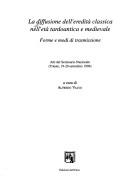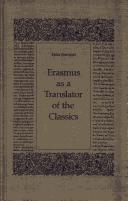| Listing 1 - 6 of 6 |
Sort by
|
Book
ISBN: 9782812408601 9782812411052 2812411058 281240860X Year: 2013 Volume: 52 Publisher: Paris: Classiques Garnier,
Abstract | Keywords | Export | Availability | Bookmark
 Loading...
Loading...Choose an application
- Reference Manager
- EndNote
- RefWorks (Direct export to RefWorks)
Contributions sur la tradition, facteur d'identité culturelle, de la translatio, traduction et transfert, du corpus des oeuvres de l'Antiquité. L'histoire de la translatio, jalonnée de lacunes et de ruptures, est porteuse d'enjeux idéologiques.
Theory of literary translation --- Classical literature --- Littérature grecque --- --Littérature latine --- --Traduction --- --Classical literature --- Translations --- History and criticism --- Adaptations --- Translating classical literature --- History and criticism. --- Translating and interpreting --- Littérature ancienne --- Traduction et interprétation --- Histoire et critique --- Littérature latine --- Traduction --- Classical literature - Translations - History and criticism --- Classical literature - Adaptations - History and criticism
Book
ISBN: 9782841334308 2841334309 Year: 2013 Publisher: Caen: Presses universitaires de Caen,
Abstract | Keywords | Export | Availability | Bookmark
 Loading...
Loading...Choose an application
- Reference Manager
- EndNote
- RefWorks (Direct export to RefWorks)
Ce volume compare les différentes traditions nationales de lecture et de réécriture des littératures antiques et s'interroge sur un éventuel héritage commun. Il montre que la connaissance des langues anciennes et du patrimoine historique qu'elles véhiculent est un aspect fondateur de l'identité européenne.
Classical literature --- Littérature ancienne --- Translations --- History and criticism --- Traductions --- Histoire et critique --- Translating and interpreting --- History --- Littérature ancienne --- Classical literature - Translations - History and criticism - Congresses --- Translating and interpreting - Europe - History - 19th century - Congresses --- Translating and interpreting - Europe - History - 20th century - Congresses

ISBN: 8876942521 9788876942525 Year: 1997 Volume: 1 Publisher: Alessandria: Ed. dell'Orso,
Abstract | Keywords | Export | Availability | Bookmark
 Loading...
Loading...Choose an application
- Reference Manager
- EndNote
- RefWorks (Direct export to RefWorks)
Classical literature --- Civilization, Medieval --- Classicism --- Transmission of texts --- Translations --- History and criticism --- Congresses. --- Appreciation --- Classical influences --- -Classical literature --- -Classicism --- -Transmission of texts --- -Literary transmission --- Manuscript transmission --- Textual transmission --- Criticism, Textual --- Editions --- Manuscripts --- Pseudo-classicism --- Aesthetics --- Literature --- Civilization, Classical --- Literature, Classical --- Literature, Ancient --- Greek literature --- Latin literature --- Medieval civilization --- Middle Ages --- Civilization --- Chivalry --- Renaissance --- -Congresses --- -History and criticism --- Congresses --- History --- -Classical influences --- Classical literature - Translations - History and criticism - Congresses --- Classical literature - Appreciation - Middle East - Congresses --- Civilization, Medieval - Classical influences - Congresses --- Classicism - Middle East - Congresses --- Transmission of texts - Congresses
Book
ISBN: 9782840508113 2840508117 Year: 2012 Volume: *5 Publisher: Paris: PUPS,
Abstract | Keywords | Export | Availability | Bookmark
 Loading...
Loading...Choose an application
- Reference Manager
- EndNote
- RefWorks (Direct export to RefWorks)
Theory of literary translation --- Classical literature --- anno 1400-1499 --- anno 1500-1799 --- Translating and interpreting --- Europe --- Classical languages --- Latin language, Medieval and modern --- Greek literature --- Greek language --- History --- Intellectual life --- Translations --- History and criticism --- Translating --- Translations into Latin --- Translating into Latin --- Balkan literature --- Byzantine literature --- Classical philology --- Greek philology --- Indo-European languages --- Interpretation and translation --- Interpreting and translating --- Language and languages --- Literature --- Translation and interpretation --- Translators --- Literature, Classical --- Literature, Ancient --- Latin literature --- Dead languages --- Languages, Classical --- Translating&delete& --- Translations&delete& --- Translating into Latin&delete& --- Translations into Latin&delete& --- Intellectual life. --- Translating and interpreting - Europe - History --- Europe - Intellectual life --- Classical literature - Translations - History and criticism --- Classical languages - Translating - History --- Latin language, Medieval and modern - Translating --- Greek literature - Translations into Latin - History and criticism --- Greek language - Translating into Latin - History

ISBN: 0802056539 1442615141 9786612039515 1282039512 1442674547 9781442674547 9780802056535 9781442615144 Year: 1985 Volume: 7 Publisher: Toronto: University of Toronto press,
Abstract | Keywords | Export | Availability | Bookmark
 Loading...
Loading...Choose an application
- Reference Manager
- EndNote
- RefWorks (Direct export to RefWorks)
This first full-length study of Erasmus’ translations of classical literature examines his approach to translation and, more generally, his role as a transmitter of the classics. It traces in chronological order the progress of his Greek studies and the publication history of his translations from Greek into Latin; these included selections from the works of Libanius, Euripides, Plutarch, Lucian, Galen, Isocrates and Xenophon. It also illustrates Erasmus’ methods with appropriate examples from his own texts and from those of his predecessors and contemporaries. In so doing it provides an overview of the state of Greek literature in the Renaissance.Erasmus shifted from literal translation to a more liberal approach – a change in attitude that was accompanied by a redefinition of his role as translator. In his early work he had pursued private goals, regarding his versions from secular authors as private pieces for his magnum opus, the New Testament. In later years his approach became more reader-oriented. He saw his work in terms of a service to scholarship – making Greek literature accessible to Latin readers and acting as their guide to classical thought. He was concerned not only with the mechanics of conveying the factual contents and literary qualities of the original, but also with the applicability of its moral content to Christian philosophy.This book includes a chapter on Erasmus’ New Testament version; by allowing a fuller evaluation of Erasmus’ contribution to philology, this subject adds an important dimension to the book. Erasmus’ translations of Greek texts reflect two concerns that dominated his life. As an educator he wanted to see classical philology firmly established in the curriculum of schools; as a Christian humanist he wanted to convince biblical scholars that it was an indispensable tool of their profession.
Theory of literary translation --- Classical Greek language --- Classical Latin language --- Erasmus, Desiderius --- Translating and interpreting --- Greek literature --- Classical literature --- Greek language --- Classical languages --- Humanists --- Dead languages --- Languages, Classical --- Literature, Classical --- Interpretation and translation --- Interpreting and translating --- Language and languages --- Literature --- Translation and interpretation --- History --- Translations into Latin --- History and criticism. --- Translations --- Translating into Latin --- History. --- Translating into Latin. --- Translating. --- Translating --- Erasmus, Desiderius, --- Érasme --- Desiderius Erasmus --- Erasm, Dezideriĭ --- Erasme, Désiré --- Erasmo, --- Erasmo, Desidério --- Erasmus, --- Ėrazm, --- Erazm, --- Roterodamus, Erasmus --- Rotterdamskiĭ, Ėrazm --- Rotterdamský, Erasmus Desiderius --- Роттердамский, Эразм --- Эразм, --- Ерасм, Дезидерий --- Netherlands --- Intellectual life --- Scholars --- Indo-European languages --- Classical philology --- Greek philology --- Literature, Ancient --- Latin literature --- Balkan literature --- Byzantine literature --- Translators --- Translations&delete& --- History and criticism --- Translating into Latin&delete& --- Translations into Latin&delete& --- Erasmus Roterodamus, Desiderius --- Erasmus --- HISTORY / Renaissance. --- エラスムス, デシデリウス --- Translating and interpreting - Netherlands - History - 16th century --- Greek literature - Translations into Latin - History and criticism --- Classical literature - Translations - History and criticism --- Greek language - Translating into Latin - History --- Classical languages - Translating --- Humanists - Netherlands --- Erasmus, Desiderius, - -1536 --- Netherlands - Intellectual life - 16th century --- Desiderius Erasmus, --- Erasm, Dezideriĭ, --- Erasme, Désiré, --- Erasmo, Desidério, --- Roterodamus, Erasmus, --- Rotterdamskiĭ, Ėrazm, --- Rotterdamský, Erasmus Desiderius, --- Роттердамский, Эразм, --- Ерасм, Дезидерий, --- אראסמוס, דסידריוס, --- Erasme, didier (1469-1536) --- Litterature classique
Book
ISBN: 9782708408722 2708408720 2369430788 2708408380 9782708408388 Year: 2010 Volume: 10 Publisher: Paris (82, rue Bonaparte 75006) : Éditions Picard,
Abstract | Keywords | Export | Availability | Bookmark
 Loading...
Loading...Choose an application
- Reference Manager
- EndNote
- RefWorks (Direct export to RefWorks)
La christianisation du monde antique est un thème central d'un point de vue historique (c'est un des rares événements dont les conséquences ont été essentielles pour l'histoire mondiale), d'un point de vue historiographique (c'est un des grands sujets d'étude de la fin de l'Antiquité gréco-romaine avec la disparition de l'Empire d'Occident et la fin du système civique classique), mais aussi d'un point de vue méthodologique. En effet, on croit couramment que la christianisation du monde antique fut une réalité qu'il suffirait de décrire, alors qu'il s'agit en fait de la penser, car elle est d'abord une représentation des historiens héritée de modèles antiques (Eusèbe de Césarée, Augustin d'Hippone) ou modernes (Voltaire, Marx, Freud). Pour pouvoir traiter « la christianisation du monde antique » comme sujet historique, il faut donc d'abord réfléchir sur une question d'historiens : « le problème de la christianisation du monde antique ». Pour cela, il faut faire un peu d'histoire moderne et contemporaine, analyser l'apparition et le sens du terme de christianisation, et faire le bilan de l'historiographie de la question. Ensuite, on peut tenter de penser « la christianisation du monde antique » de quatre manières : par l'analyse philologique des termes désignant la conversion en grec, latin et syriaque ; par l'étude des sources littéraires chrétiennes à propos des chrétiens, afin de mettre en évidence les représentations antiques du problème de la définition du chrétien; par le recours aux sources non littéraires (épigraphie, papyrologie, archéologie funéraire, archéologie monumentale, iconographie) afin de contourner la question des représentations liées aux textes antiques ; par l'enquête sur les sources littéraires chrétiennes à propos de la conversion des païens, qui permet de déconstruire des textes qui créaient une réalité autant qu'ils la décrivaient. Ainsi, en questionnant les évidences qui structurent nos pensées sur le passé, on peut espérer les distancier afin de mieux comprendre comment le monde antique est devenu chrétien.
Conversion --- Evangelistic work --- Church history --- Evangelisation --- Eglise --- Christianity --- History of doctrines --- History --- Christianisme --- Histoire des doctrines --- Histoire --- Ancient religious history --- Christianization --- 266 --- Missies. Evangelisatie. Zending --- Religious conversion --- Psychology, Religious --- Proselytizing --- Évangélisation --- --Antiquité --- --Historiographie --- --Congrès --- --Christianity --- Religion --- Philosophy & Religion --- Church history - Primitive and early church, ca. 30-600 - Congresses --- Conversion - Christianity - History - To 1500 - Congresses --- Antiquité --- Historiographie --- Congrès --- Christianisation --- Christianisme antique --- Classical languages - Translating --- Classical literature - Translations - History and criticism --- Translating and interpreting - History - To 1500 --- Languages in contact - Greece --- Languages in contact - Rome --- Transmission of texts - Greece --- Transmission of texts - Rome --- Languages in contact --- Transmission of texts --- Classical literature --- Langues en contact --- Transmission de textes --- Littérature ancienne --- Translating. --- Traduction --- Classical languages --- Translating and interpreting --- Interpretation and translation --- Interpreting and translating --- Language and languages --- Literature --- Translation and interpretation --- Translators --- Areal linguistics --- Dead languages --- Languages, Classical --- Literature, Classical --- Literature, Ancient --- Greek literature --- Latin literature --- Translating --- Translations --- History and criticism --- Antike. --- Übersetzung. --- History and criticism. --- Greco-Roman linguistic studies. --- Littérature antique --- Bilinguisme --- Traduction et interprétation --- Traductions --- Histoire et critique --- Antiquité --- Critique textuelle --- Evangélisation
| Listing 1 - 6 of 6 |
Sort by
|

 Search
Search Feedback
Feedback About UniCat
About UniCat  Help
Help News
News